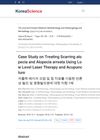TLDR Korean medicine may help with hair growth in alopecia, but more research is needed to confirm this.
This literature review analyzed 22 studies involving 1,464 patients to assess the effectiveness of Korean medicine treatments for alopecia. The treatments included herbal medicine, acupuncture, external medicine or products, pharmacopuncture, and phototherapy. The most common type of alopecia treated was alopecia areata (87.8% of cases). Herbal medicine was the most frequently used treatment (83.3% of cases), with Gagam Cheongyoung-tang and Gagam Hwajung-hwan being primarily used. The most commonly used acupuncture point was GV20. The treatments were found to be effective in promoting hair growth and reducing hair loss, but side effects such as pruritus, dizziness, drowsiness, headache, and pain were reported in seven studies. The review concluded that Korean medicine could be a potential alternative treatment for alopecia, but more high-quality, large-scale studies are needed to confirm these findings.
3 citations
,
May 2020 in “Journal of The Korean Medical Association” Minoxidil and finasteride are effective for treating hair loss, with dutasteride showing potential but with side effects.
 24 citations
,
June 2019 in “Journal of Cosmetic Dermatology”
24 citations
,
June 2019 in “Journal of Cosmetic Dermatology” Scalp microneedling may improve hair density and thickness for various alopecia types.
 1 citations
,
November 2016 in “Hanbang an'i'bi'in'hu pibu'gwa haghoeji”
1 citations
,
November 2016 in “Hanbang an'i'bi'in'hu pibu'gwa haghoeji” Low level laser therapy and acupuncture significantly improved hair growth in a patient with alopecia.
9 citations
,
August 2014 in “The Journal of Korean Medicine Ophthalmology and Otolaryngology and Dermatology” The woman's hair loss improved significantly with pharmacopuncture and needle-embedding therapy.
 5 citations
,
August 2013 in “The Journal of Pediatrics of Korean Medicine”
5 citations
,
August 2013 in “The Journal of Pediatrics of Korean Medicine” The treatments helped the girl's hair grow back, but more research is needed for different types of hair loss.
 4 citations
,
May 2013 in “The Journal of Korean Medicine Ophthalmology and Otolaryngology and Dermatology”
4 citations
,
May 2013 in “The Journal of Korean Medicine Ophthalmology and Otolaryngology and Dermatology” Korean medicine effectively treats febrile alopecia, shifting focus from genetic to febrile causes.
 85 citations
,
October 2012 in “Dermatologic Clinics”
85 citations
,
October 2012 in “Dermatologic Clinics” Alopecia Areata is an autoimmune condition often starting before age 20, with varied treatment success and a need for personalized treatment plans.
 62 citations
,
April 2004 in “Expert Opinion on Pharmacotherapy”
62 citations
,
April 2004 in “Expert Opinion on Pharmacotherapy” Finasteride effectively treats male pattern baldness, improving hair growth and density.
 19 citations
,
January 1987 in “Dermatology”
19 citations
,
January 1987 in “Dermatology” Minoxidil slows down skin cell growth and may help treat scars and skin conditions.
May 2019 in “Journal of Acupuncture Research” Sebalgukhwa-san (SGS) can help treat hair loss without liver toxicity.
 1 citations
,
May 2017 in “InTech eBooks”
1 citations
,
May 2017 in “InTech eBooks” Some natural remedies may help with hair regrowth, but more research is needed to confirm their effectiveness and safety.
 2 citations
,
October 2015 in “Indian journal of science and technology”
2 citations
,
October 2015 in “Indian journal of science and technology” SM-215 promotes hair growth by improving the environment around hair follicles.

Sinsun-yukza-hwan extract promotes hair growth in mice.
 67 citations
,
May 2018 in “Journal of Ginseng Research”
67 citations
,
May 2018 in “Journal of Ginseng Research” Red ginseng may improve immunity, fatigue, memory, blood circulation, and menopausal symptoms, and is generally safe to consume.











